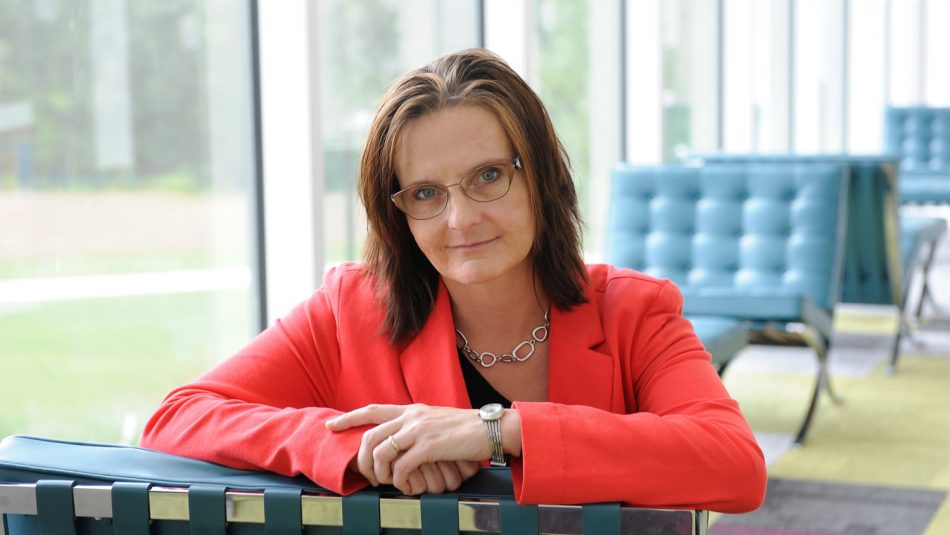Genetic Engineering and Society Jennifer Kuzma
Goodnight-NC GSK Foundation Distinguished Professor/Co-Director GES Center
Jennifer Kuzma, PhD.; Goodnight-NCGSK Foundation Distinguished Professor in the School of Public and International Affairs, and co-founder and co-director of the Genetic Engineering and Society (GES) Center at NC State University. The GES Center represents a key interdisciplinary cluster at NC State of over 30 affiliated faculty and graduate students that integrates science and public values to inform the future of genetic engineering. The Center maintains external partnerships with stakeholders locally, nationally and globally, and has led several research, education and engagement initiatives that improve dialogue, technology development, and decision making about the applications of genetic engineering.
Prior to her current position, Kuzma was associate professor of science and technology policy at the Humphrey School of Public Affairs, University of Minnesota (2003-2013). Here she was area and degree program chair of science, technology and environmental policy; associate and interim director of the Center for Science, Technology, and Public Policy; co-PI of the National Science Foundation (NSF) Interdisciplinary Graduate Education and Research Traineeship Risk Analysis for Introduced Species; and associate director of the Initiative for Renewable Energy and the Environment. Before that (1997-2003), she served as program and study director for several U.S. National Academy of Sciences reports related to biotechnology governance and bioterrorism and as an American Association for the Advancement of Science (AAAS) Risk Policy Fellow at the U.S. Department of Agriculture (USDA) Office of Risk Assessment and Cost Benefit Analysis.
She has over 120 scholarly publications on emerging technologies, risk analysis, regulatory policy, and governance and has been studying these areas for over 25 years. Her recent work on biotechnology governance has been funded by the Alfred P. Sloan Foundation, NSF, and USDA. She is currently co-PI of a new NSF-National Research Traineeship interdisciplinary graduate program on agricultural biotechnology in food, energy and water systems (AgBioFEWS).
Kuzma has held several local, national and international leadership positions, including a member of World Economic Forum Global Futures Council on Technology, Values and Policy; the U.S. National Academy of Sciences’ Committee on Preparing for Future Biotechnology, Society for Risk Analysis (SRA) Council Member and Secretary, chair of the Gordon Conference on Science & Technology Policy, Member of the US FDA Blood Products Advisory Committee, AAAS-American Bar Association National Council of Scientists and Lawyers, Governor’s Bioscience Advisory Committee, and a Member of the UN WHO-FAO Expert Group for Nanotechnologies in Food and Agriculture. In 2014, she received the SRA Sigma Xi Distinguished Lecturer Award for recognition of her contributions to the field of risk analysis, and in 2017-2018 she was awarded the Fulbright Canada Research Chair in Science Policy at the University of Ottawa. In 2019 she was elected a Fellow of the AAAS for distinguished translational work in bridging the bench and society, advancing anticipatory governance of new technologies, and contributions to methods for oversight policy analysis. She was one of the early pioneers in studying the societal implications of gene editing, synthetic biology, and agrifood nanotechnology. She is interviewed frequently in the media for her work and expertise in technology policy, including the New York Times, Science, The Scientist, Nature, NPR, Washington Post, Scientific American, Boston Globe, PBS Nova, Wired, and ABC and NBC News.
She obtained her Ph.D. in biochemistry from the University of Colorado Boulder in 1995. Here she discovered bacterial isoprene production and holds the first patent for methods for bacterial production of isoprene (bioisoprene). Her postdoctoral work was completed at the Rockefeller University in New York where she worked on plant drought and salinity tolerance mechanisms, leading to an article in the journal Science.

